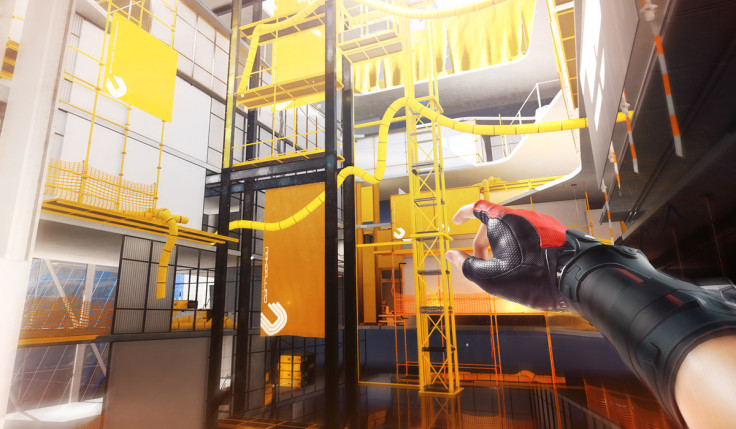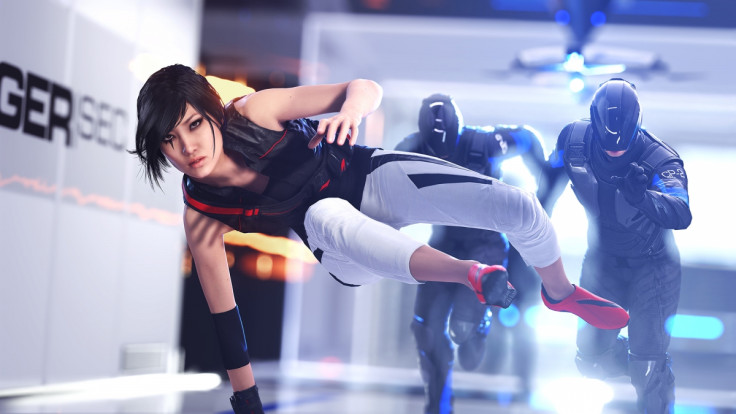Mirror's Edge Catalyst: DICE's Erik Odeldahl discusses heroine Faith, rebooting the series and virtual reality

On 24 May Electronic Arts (EA) will finally release Mirror's Edge Catalyst, the long-awaited follow-up to 2008's cult classic free-running adventure game, on PS4, Xbox One and PC.
Rather than produce the expected sequel, the team at EA DICE has decided to reboot the story and start afresh, adding an open world to explore. There is an even greater emphasis on its fluid, free-running gameplay and hand-to-hand combat content.
Ahead of the closed online beta, which runs from 22- 26 April, IBTimes UK sat down with the game's design director Erik Odeldahl to discuss the game, its heroine Faith and whether this is the series' last chance.
Why did DICE decide to reboot the series?
"One of the major reasons was we wanted to flesh out the world, to give the world a history, and we wanted to investigate our protagonist Faith's role in that world. A big part of choosing to do it, is because instead of always having to think about how things fit with the first game, we said: 'Let's just clean [the] slate, but not lose track of the things that were really great about the first game – the gameplay, the aesthetics, Faith, the audio-scape and the soundtrack etcetera – let's keep that, but story-wise work from a clean slate.' So, we wanted to redefine Faith and the world, the way we wanted to."
What was the greatest challenge the team faced during development?
"I'd say there were a number of technical challenges, of course. The whole City Of Glass is one giant level, and since this isn't a game about walking down on the streets, when you're on the rooftop you can see very far. So there were technical challenges in how we could show off the whole city to the player. And also design-wise, the gameplay is still unique. The first-person parkour [freerunning] genre isn't exactly gigantic, so there are some elements you can't lean back on in terms of game design because they might not work in first person or if you're moving at speed. So there have been challenges throughout but most have been solved by iterating – that's how great games are made."
Faith doesn't use guns this time around. What was the reasoning behind this and was it a contentious design decision?
"There was not much debate at all actually. It was something that we felt, there's lots we love about the first game but the gunplay... We didn't want to slow the player down with it. And another thing, when we were redefining Faith, we gave her more of a history that defines her character and shooting people just isn't part of who she is. Removing gunplay from a first-person game is a challenge, and as game developers we should be challenging ourselves. First-person melee combat is certainly not easy. I think that was a challenge, but it was the right thing to do."
Was part of the reason to remove the expectations people might have when seeing a game that might look to them like a FPS, when really Mirror's Edge has never been one?
"We didn't discuss it like that. We've known, always, that Mirror's Edge – the aesthetics, how you play – is different from most first-person games, so it wasn't about removing something. But taking guns out created another challenge because people are so used to seeing a gun in first person... I'm not saying it's easy to make a first-person shooter – God knows I've been involved with a few [laughs] – but the thing is, I feel that for Catalyst, shooting people would have been almost like a cheat, because it isn't who Faith is and it isn't what we want the player to do."
The other big change in Catalyst is its open world. What can people expect from it and roughly what size will it be?
"We never talk about it as an open world – we talk about it as free-roaming. It's not one giant sandbox, you start in a certain part of the city and then as you move through the storyline new parts of the city open up. Each of those areas has its own audio and visual themes, and their own story missions in them. There is also tons of other stuff − side missions, where characters ask for help, smaller types of side missions, environmental puzzles, secrets, collectables, races and more. The important thing is we don't mandate when you must do something, it's up to the player."

What makes Faith stand out from her fellow female protagonists?
"Faith is such a big part of what Mirror's Edge is – the way she looks and moves is as important to the games as the aesthetics or audio. What we're doing in Catalyst is, we're taking her on a journey from [a] kind of character to a true heroine. It's her origin story. The thing with Faith is, even though things get really hard for her at times in the game, she's always someone who rises to the challenge and tries to do the right thing. We want her to be a true heroine, a symbol of hope."
The period of 2008 was a time of grey-brown military shooters, and then here was this stark, bright, colourful first-person action game that didn't focus on gunplay. In that sense was Mirror's Edge ahead of its time?
"I certainly think it was ahead of its time, it's still a very unique experience. Until Catalyst, I can't think of another major game like it. Personally I'm happy with games opening up and trying new, different things. There are smaller indie titles with first-person parkour and I love that. I'd love to see more games take on the first-person movement we're doing."
Do you think the game's uniqueness was perhaps why it wasn't quite the success DICE or EA had wanted?
"Maybe, it's a very popular title now, lots of people have played it now. It has a uniqueness that makes people come back and there's still a very active speed-running and racing community. Over the years it has proven quite popular."
Many people have wanted a sequel for a long time, and would presumably like to see more games in the future but is the harsh reality that this is the series' last chance?
"I honestly don't know, I just build games. It's a title we're really proud of. I've played the game in different forms over the years and I still have good fun. We'll see what happens."
You're always being asked about VR because the IP seems like a natural fit, but really the games as they are wouldn't work in virtual reality. Do you agree, and what do you think a hypothetical Mirror's Edge might be like?
"I have some experience in trying VR stuff out, and I think − this going to sound like such a cliché − but it really is a new frontier. There are obvious things that you can take from regular development over to VR, but it's going to require a completely different kind of thinking when it comes to movement and stuff like that. When you think of VR, Mirror's Edge seems like an obvious thing but, as you say, it just won't work, it needs to be recreated for VR in some way. All good development is when you iterate and try out ideas, 30-40 ideas, until you crack how it's going to work, and that's for another day."
For all the latest video game news follow us on Twitter @IBTGamesUK.
© Copyright IBTimes 2025. All rights reserved.



















